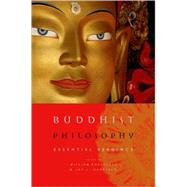
Buddhist Philosophy Essential Readings
- ISBN13: 9780195328172
- ISBN10: 0195328175
- eBook ISBN(s): 9780199886913
- Format: Paperback
- Copyright: 2009-04-21
- Publisher: Oxford University Press
Note: Supplemental materials are not guaranteed with Rental or Used book purchases.
-
Your order must be $35 or more to qualify for free economy shipping. Bulk sales, PO's, Marketplace items, eBooks and apparel do not qualify for this offer.
-








